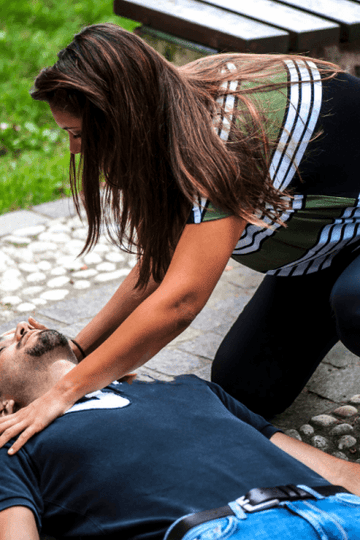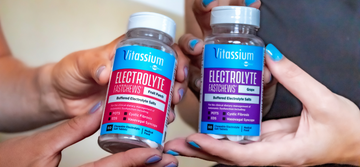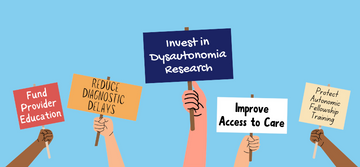
Every year, three percent of all emergency room visits are caused by someone fainting. While the act of passing out is generally not fundamentally dangerous, losing consciousness can be harmful if a person cannot control his or her fall (to avoid a sharp object, for example).
People living with autonomic disorders such as POTS or vasovagal syncope are usually familiar with the fainting experience, which can be unpleasant and accompanied by sweating, nausea and intense feelings of anxiety. It is common to wonder whether anything can be done to alleviate or prevent fainting spells altogether.
In this blog, we dive into the science to explain what causes fainting.
BLOOD FLOW AND THE BRAIN
Fainting, known as “syncope” (pronounced: SING kuh pee) in the medical community, is defined by the U.S. National Institutes of Health as a temporary loss of consciousness due to the sudden decline of blood flow to the brain.
When we go from a position of lying down to sitting, or from sitting to standing, about 10-15 percent of our blood pools in our legs, arms and abdomen, due to gravity. In healthy people, the autonomic nervous system kicks in and triggers the heart to beat faster and blood vessels in our lower body to constrict, which forces blood upwards so it reaches the heart and brain. The entire process happens automatically and so quickly, we usually do not notice.
However, if this process is hampered, it can lead to fainting. Our brains rely on the bloodstream to receive oxygen, glucose and other nutrients to keep functioning. In fact, even two minutes without oxygen can cause irreversible brain damage. When blood flow is blocked or slowed, the brain shuts down consciousness to force the individual into a position of lying down, which allows gravity to restore blood flow to the brain and the delivery of vital nutrients.
Many things can cause a disruption in blood flow, including low blood sugar, excessive alcohol consumption or high levels of anxiety. The cause can also be chronic, in cases of a heart condition or autonomic disorder. If it is the latter, fainting is usually the result of one of two things:
- Vasovagal syncope: In cases of vasovagal syncope, increased activity of the vagal nerve, which controls a person’s heart rate and blood pressure, improperly causes the heart to slow down and blood vessels to dilate, preventing enough blood from getting to the brain.
- Orthostatic hypotension: People who manage orthostatic hypotension usually have a hampered ability to adjust to changes in position (from lying to sitting up, for example). When they sit or stand up too quickly, their blood vessels adapt too slowly to keep proper amounts of blood flowing to the brain.
WHAT HAPPENS TO YOUR BODY WHEN YOU FAINT?
For people living with autonomic disorders like POTS or vasovagal syncope, fainting can be common. During the process, the following physiological changes can occur:
You could start seeing spots. The human eye is pressurized, and when blood flow to the head drops, the blood vessels in our eyes can begin to collapse, leading to the telltale “spots” or “tunnel vision” that precludes blacking out.
Your heart starts could start pounding and you could start to hyperventilate. When the brain doesn’t receive enough oxygen, it directs the heart and lungs to beat faster and force in more air. It may also instruct the adrenal glands to release adrenaline and cortisol, which help constrict blood vessels and counteract low blood pressure. These “fight or flight” hormones also cause the heart to beat faster and a person to feel increased levels of anxiety.
You could get hot. In addition to oxygen and nutrients, blood also carries heat. Once the brain instructs the heart to rapidly move blood through the body to increase blood flow, we can experience a rush of blood to our extremities. This can feel like a flash of heat – sometimes so intense it can cause us to break out in a sweat.
You could feel nauseous. If dehydration is to blame for low blood pressure, we can often feel nauseous as a result. When water levels in the digestive system drop too low, food can’t be digested properly, causing stomach discomfort.
You could experience hearing distortion. Similar to disruptions in vision, when too much blood is pulled away from your head due to gravity, you can experience changes to your hearing, including distortions, buzzing or a muffling of all sounds.
WHAT SHOULD YOU DO IF YOU FAINT?
Fainting itself is generally not dangerous, and the episode will usually pass after a few minutes. To speed recovery, it is best to lie in a cool, quite place and sip on water to help maintain hydration levels. If lying down is not possible, the ideal position is to sit with your head between your knees, which keeps the brain at about the same height as the heart and can aid blood flow.
If you experience fainting several times in a short period, or in tandem with more serious symptoms such as chest pain or heart palpitations, it is best to consult with a physician to ensure something more serious is not the root cause.
CAN YOU PREVENT FAINTING SPELLS?
People living with autonomic conditions like vasovagal syncope or POTS must manage the possibility of fainting most days. Because their bodies have a harder time keeping blood from pooling in the feet and abdomen, they must take steps to ensure they do not stand or sit in one position for too long. Dehydration can also worsen symptoms, and proper consumption of water and electrolytes is advised.
Many individuals with POTS and other forms of dysautonomia are advised by their physicians to consume two to three liters of hydrating fluids and eight to 10 grams of salt per day.
The following tips can help alleviate the possibility of fainting:
- Avoid sitting or standing still for too long. From long shopping lines to lengthy car rides, a lack of movement can contribute to improper pooling of the blood in the lower body. If you find yourself in a situation that prevents full-body movement, try to take regular breaks to flex your muscles and restore blood flow.
- Avoid situations that can lead to dehydration. Saunas, hot tubs, outdoor activities and even lying by the pool in the sun can all speed dehydration, which leads to lower blood volume. This can increase the possibility of fainting because there is less blood to move upward to the brain.
- Increase water and salt intake. Salt and water intake are linked to blood pressure, and people living with POTS are often advised to increase both to help counteract improper blood pooling. In fact, most individuals with POTS and other forms of dysautonomia are advised by their physicians to consume two to three liters of hydrating fluids and eight to 10 grams of salt per day.
If you decide under the guidance of a physician to increase salt intake, you may find it challenging to get enough sodium into your diet through salty foods and drinks. In such cases, supplements like SaltStick® Vitassium® can make things easier by providing concentrated forms of sodium in a form that is easily absorbed by your body without leading to stomach upset. Vitassium is a medical food specifically formulated to provide sodium and potassium for the clinical dietary management for patients with conditions like CF, when increased plasma volume has been shown to be beneficial, so that you can Get Your Life Back®. Each two-capsule serving contains 500 mg of sodium (22 mmol sodium, 1270 mg sodium chloride) and 100 mg of potassium.
If you live in the U.S. and you want to learn more about Vitassium, consider the SaltStick Vitassium Club. It’s free to join, and as a member, you’ll get access to a 20% discount on all our products, along with free shipping on orders worth $75 or more. Learn more about the Vitassium Club here.
Disclaimer: Contact your physician before starting any exercise program or if you are taking any medication. Individuals with high blood pressure should also consult their physician prior to taking an electrolyte supplement. Overdose of electrolytes is possible, with symptoms such as vomiting and feeling ill, and care should be taken not to overdose on any electrolyte supplement.







